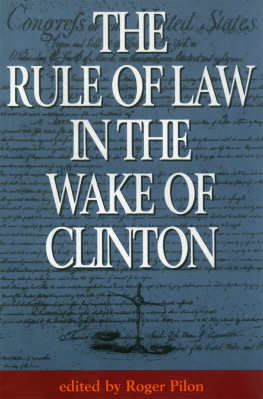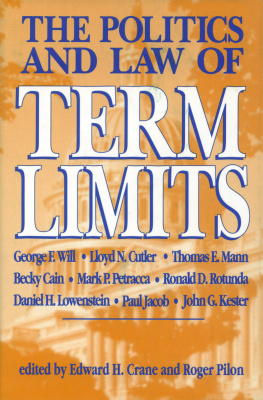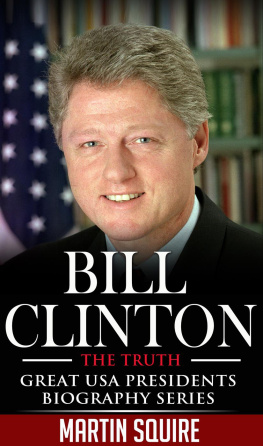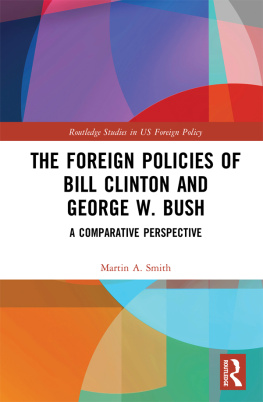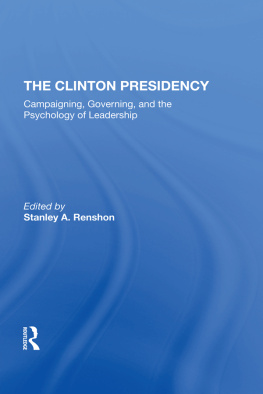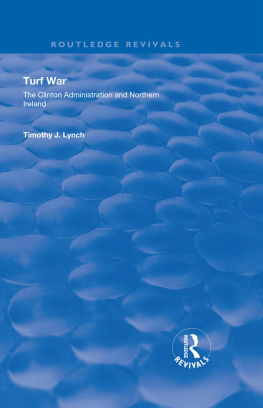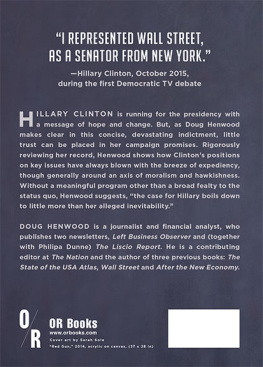THE
RULE OF LAW
IN THE
WAKE OF
CLINTON
THE
RULE OF LAW
IN THE
WAKE OF
CLINTON
edited by
Roger Pilon

INSTITUTE
Washington, D.C.
Copyright 2000 by the Cato Institute.
All rights reserved.
Second Printing: December 2000
Third Printing: March 2001
Library of Congress Cataloging-in-Publication Data
The rule of law in the wake of Clinton / edited by Roger Pilon.
p. cm.
Includes bibliographical references.
ISBN 1-930865-03-1 (pbk.)
1. Rule of law-United States. 2. Civil rights-United States. 3. Law and politics. 4. Clinton, Bill, 1946-I. Pilon, Roger. II. Cato Institute.
KF382.R853 2000
340'.11-dc21 00-063853
Cover design by Elise Rivera.
Printed in the United States of America.
C ATO I NSTITUTE
1000 Massachusetts Ave., N.W.
Washington, D.C. 20001
Introduction
Roger Pilon
For millennia, history has taught that civilization and human progress depend on the rule of law. That lesson is evident today in nations around the world in which law barely exists. To the extent that the rule of law is eclipsed by the rule of man, civilization, progress, and real people are the victims. Indeed, America, which arose as a revolt against official disrespect for the law, is a testament to the importance of the rule of law.
Yet even in America, as the reach of government and hence of politics has grown, we have seen increasing indifference to law and legal institutions, coming often from those very institutions, and especially when law stands opposed to political ends. Over the nearly eight years of the Clinton administration, however, the disrespect has grown alarmingly, in many areas, and in ways both obvious and subtle. This volume documents at least some of those abuses.
Based on presentations made at a conference the Cato Institute held on July 12, 2000, the essays that follow draw together, in one place, a host of recent assaults on the rule of law. Taken together, they give us a glimpse of the state of the rule of law in the wake of Clinton. It is not a picture that gives comfort. In area after area, President Clinton and his administration have been indifferent and even hostile to elementary principles central to the rule of law. Their preference, it seems, is for the rule of man, and for the immediate advantage that affords.
When we think of recent assaults on the rule of law, the endless scandals that have surrounded the Clinton administration come immediately to mind, of course, along with the administration's repeated efforts to frustrate investigations of those scandals. But the scandals and the cover-ups are only the tip of the iceberg. In its political agenda, its legal briefs, and its executive actions, this administration has ignored both constitutional limits on government power and constitutional guarantees of individual liberty. In addition, in the name of restraining and even punishing unpopular industries, the administration has variously launched, encouraged, or joined assaults on centuries-old common law principles while abandoning prudence in the application of statutes. And it has politicized the institutions of justice at home while showing studied indifference to limits on its power abroad. Yet in all of that, the guardians one would normally expect to be defending the rule of law have been either ineffective or complicit, raising serious questions about whether respect for the rule of law will long endure.
To develop those conclusions and give evidence supporting them, it is crucial to begin by defining just what we mean by the rule of law, then to explain and justify our allegiance to the idea. With those understandings before us, we can then examine the Clinton record in its many particulars to determine just how far this administration has departed from the rule of law, undermining our first principles as a nation in the process.
Our Heritage-The Rule of Law
In the volume's opening essay, "Civilization, Progress, and the Rule of Law," Lillian BeVier sets the stage for the essays that follow by addressing both the meaning of the rule of law and the rationale for our allegiance to it. From antiquity to the present, she writes, a "government of laws, not of men," has stood for" a legal and political order in which clear, impersonal, universally applicable, general laws constrain the conduct of both individual citizens and those who govern them." The rule of law is meant thus to ensure order by securing for all a law that affords "equal impersonal treatment according to known rules and without regard to status, rank, or political persuasion."
But it is not order alone that the rule of law signifies; there is also a substantive element to the idea. For if the rule of law limits government's power in principle, BeVier continues, it does so "to maximize individual liberty." As John Locke wrote, "the end of the Law is not to abolish or restrain, but to preserve and enlarge Freedom: For ... where there is no Law there is no Freedom." And, BeVier adds, where there is no freedom, civilization and progress suffer. By contrast, "where freedom sustained by the rule of law persists, human ingenuity thrives and people quite simply live better, richer, longer, healthier lives." The common good that results is thus a function of the freedom of all, not something government aims at. In fact, BeVier concludes with what she calls "the corollary premise of this volume: that what is also dangerous-no, what is likely to be fatal-is to embrace a conception of the common good whose achievement could be won only in disregard of the rule of law." Indeed, one could add that it is precisely that ends-justifies-the-means attitude and approach that one notices repeatedly in the Clinton record, as the essays that follow make clear.
Drawing It All Together-An Outline
With that summation of the meaning and purpose of the rule of law before us, we tum to the application of the principles and to a systematic examination of the state of the rule of law in the wake of Clinton. We do that in two main parts: first, in the area of the Constitution; then, in the area of common law, statute, and legal institutions. As a bridge between those parts, however, we look at what are doubtless the clearest cases of disrespect for the rule of law, those that arose in connection with the scandals and corruption that have so marked the Clinton years. Finally, we look at how and why the institutions one should expect to be defending the rule of law have failed against the Clinton onslaught.
The Constitution is our starting point because our legal order is grounded, after all, in that document. The discussion of the abuse of the Constitution is itself divided into two sections: the first dealing with the assault on limited government, on the fundamental idea that our government is given only limited powers; the second dealing with the assault on individual liberty, on the complementary idea that those powers must be exercised in ways that respect our rights, enumerated and unenumerated alike. And the section treating the assault on limited government is again divided between a discussion of the administration's efforts to expand and defend congressional power and programs, which it would then execute, and a discussion of its efforts to expand and defend its own power, apart from Congress, all in contravention of the rule of law established by the Constitution.
The Assault on Limited Government
My own contribution to this volume begins by outlining America's constitutional framework, focusing especially on the centerpiece of the Constitution, the doctrine of enumerated powers. To better secure liberty, the Founders sought to limit the government they were creating by delegating to it only certain powers, which they enumerated in the document, leaving the rest with the states or the people. A limited government meant a government of limited powers. In 1937, however, following President Franklin Roosevelt's notorious Court-packing threat, the New Deal Court effectively eviscerated the doctrine, enabling Congress thereafter to redistribute and regulate virtually at will. Yet over the past decade, the Rehnquist Court has been reviving the doctrine, albeit only slowly and still at the margins; and even some in Congress have pointed increasingly to constitutional limits on their power. The Clinton administration, however, has fought that effort every step of the way. In Congress it has proposed and promoted one program after another. And in the courts it has fought every move, however modest, to limit the reach of federal power to constitutional bounds. Mr. Clinton has been, I conclude, the consummate government man, constitutional limits on federal power notwithstanding. He has exhibited little but disdain for any such limits, as if the Constitution were an empty vessel to be filled by his plans and programs. That is hardly respect for a rule of law that limits government and maximizes freedom. Indeed, it is the very thing against which BeVier warns-the pursuit of "good" in disregard of law.


